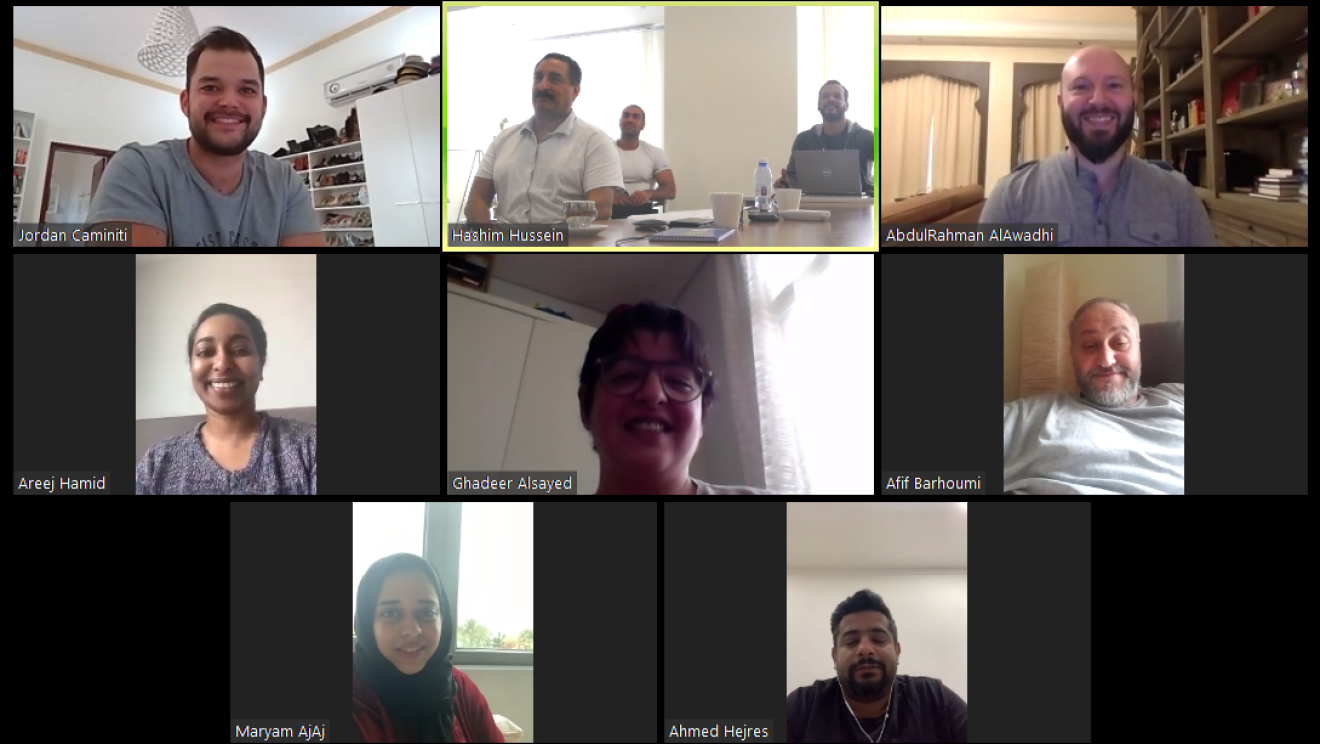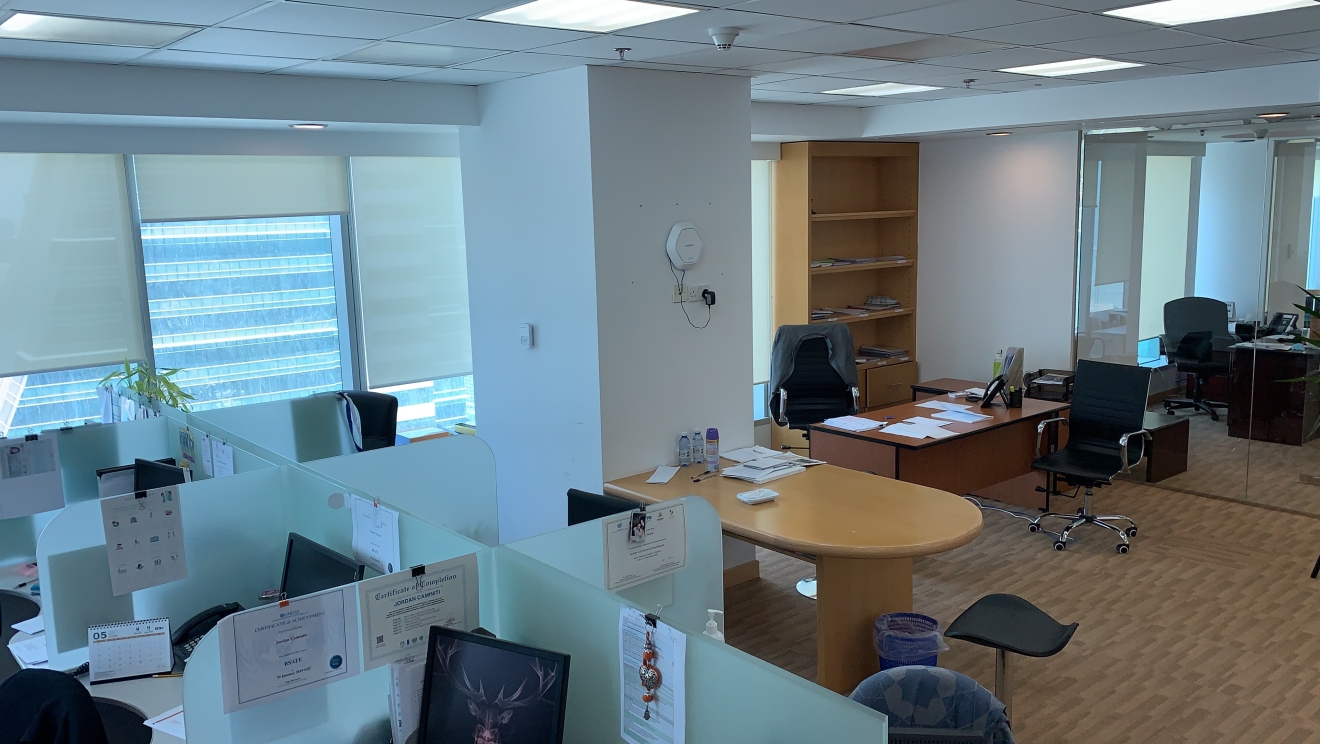

UNIDO’s ITPO Bahrain: reacting to the crisis, preparing for the aftermath
23 April 2020 Dana ZHMUDSKA

Co-authored by Jordan Caminiti
In mid-March, Bahrain had the fourth-highest per capita rate of positive COVID-19 cases worldwide. In response, the Bahraini government introduced strict precautionary measures to limit the spread of the virus, with mandatory closures of all retail and industrial businesses, and strict rules on physical distancing, such as limiting public gatherings to less than five people and prohibiting all gatherings in public parks and on beaches.
Additionally, the Civil Aviation Authority announced a significant reduction in flights to and from Bahrain. The King Fahd Causeway, the only land entry point into Bahrain that connects with Saudi Arabia was also closed to all traffic deemed non-essential. The significance of such a closure can only be expressed in the sheer volume of vehicles that normally use the causeway each day: in January, it was an average of 99,870 vehicles per day. The causeway is used by many Bahrainis to commute to work in Saudi Arabia and vice versa.
Thanks to the proactive measures taken by the Bahraini government, the lockdown has now been partially lifted for commercial enterprises, provided that they adhere to strict hygiene guidelines, such as physical distancing and limiting the number of customers in stores. Wearing face masks has also now become mandatory whilst in public.
To support the country's economy during the pandemic, His Majesty King Hamad bin Isa bin Salman Al Khalifa and the Bahraini government unveiled an US$11.39bn stimulus package to support citizens and the private sector by covering salaries for all Bahrainis, as well as water and electricity bills for all over the next three months. Moreover, all the programmes and financial services of Tamkeen, the semi-autonomous government agency that provides loans and assistance to start-ups, were redirected towards business resilience and recovery.
UNIDO’s Investment and Technology Promotion Office (ITPO) in Bahrain, known for stimulating the emergence of new and the growth of existing SMEs in the region, as well as harnessing entrepreneurial minds, is working closely with Tamkeen, the Bahrain Banking Association, Bahrain Polytechnic, the Chamber of Commerce, and other local partners on providing adequate support to MSMEs during the health crisis.
The UNIDO ITPO’s immediate response to the COVID-19 crisis is focused on identifying bottlenecks and providing advice on how to ensure the sustainability of existing entrepreneurs.
ITPO Bahrain has carried out a survey of entrepreneurs in order to define their most urgent needs and better understand the technical challenges they face in the context of COVID-19. Building on the answers, ITPO Bahrain is organizing business counselling (carried out on online platforms such as Zoom and Skype) to advise start-upers on appropriate courses of action. ITPO’s Health and Wellness Expert also provides live tips through social media channels on how to stay safe and ensure a healthy lifestyle during the pandemic.
“Fortunately, work has been able to continue with relatively minimal disruptions despite the current challenges. In a world that is so technologically connected, we have been able to easily transition to an online approach and continue to work towards inclusive and sustainable industrial development,” said Hashim Hussein, head of UNIDO’s ITPO Bahrain.
Many of ITPO-backed entrepreneurs are volunteering their services to help the government and the wider community during this unprecedented time.
Jalila Aarab from Bahrain Fashion Incubator (BFI) is cooperating with experts from the Royal College of Surgeons in Ireland in Bahrain to create 3D face visors designed to protect medical staff in hospitals. The design is based on feedback from medical practitioners and the visors are being donated to hospitals in Bahrain. She also launched a social media challenge, “Make Your Own Mask”, to encourage followers to design their own safe and practical masks to be used during daily activities such as grocery shopping.
Mahmoud Abdulsamad, owner of REPS GYM in Bahrain, is providing free online fitness classes for those under self-quarantine to ensure that citizens and residents continue being physically active and maintain the work/life balance.
Rawaf Al Hassan and his 250-strong workforce distribute propane gas, essential for activities during the pandemic, such as heating and cooking. Through its close links with the Regional World Health Organization (WHO) office in Saudi Arabia and contacts at the Ministry of Health in Bahrain, ITPO Bahrain was able to provide technical advice and guidelines on how to manage the workers’ accommodation and how to carry out daily operations with limited risks to staff health.


ITPO Bahrain is working to set the stage for an inclusive socio-economic recovery that promotes economic resilience and continues to facilitate job growth and income generation.
As requested by the Bahrain Tender Board, the aforementioned ITPO survey and virtual counselling also facilitate the proper registration of start-ups and promotes the recent royal decree that requires 20% of all products and services procured by the government to come from local companies. This decree will play a significant role in boosting recovery efforts across the Kingdom.
On the regional level, ITPO Bahrain is supporting the Union of Arab Banks in establishing a special COVID-19 fund for ministries of health and countries in the region that are facing the consequences of this major crisis.
The ITPO has managed to bring in the Union of Arab Chambers (UAC) as one of the main partners of the COVID-19 Special Fund initiative. ITPO Bahrain and the UAC have a long history of partnership, including co-organizing the Arab Entrepreneurship Rally - one of the largest entrepreneurship and innovation competitions in the Arab Region, which aims to find solutions to speed up the achievement of the Sustainable Development Goals (SDGs). The 2020/2021 edition of the Rally will focus on: vaccines and medical equipment to avoid future outbreaks; sustainable economic recovery and growth of the private sector; and the Fourth Industrial Revolution.
Commenting on the ITPO’s role in leveraging funding, Wissam Fatouh, Secretary General of the Union of Arab Banks, said, "The Union of Arab Banks is fully in line with UNIDO ITPO Bahrain’s vision towards financial inclusion, as through linking financial and non-financial services to SMEs and entrepreneurs, we can jointly ensure the success and growth of these innovative enterprises.”.
He added, “The non-financial services through the Enterprise Development and Investment Promotion Programme (EDIP) are crucial to ensure that SMEs are able to sustain and manage these difficult times."
The EDIP capacity building programme provides non-financial services to help start-up entrepreneurs achieve sustainability. It also includes services to assist existing MSMEs along the enterprise development lifecycle. EDIP provides entrepreneurs with the basics needed for owning and operating a business in Bahrain: financial management, marketing, business administration, business plan development and opportunity identification.
ITPO Bahrain, together with local ministries and other partners, is also very active in developing the Bahraini domestic investment ecosystem that is needed to help unleash innovation. This collective effort will contribute to accelerating the COVID-19 recovery phase by helping entrepreneurs successfully start, grow and expand their businesses; achieve financial inclusion; and thus contribute to the national economy.